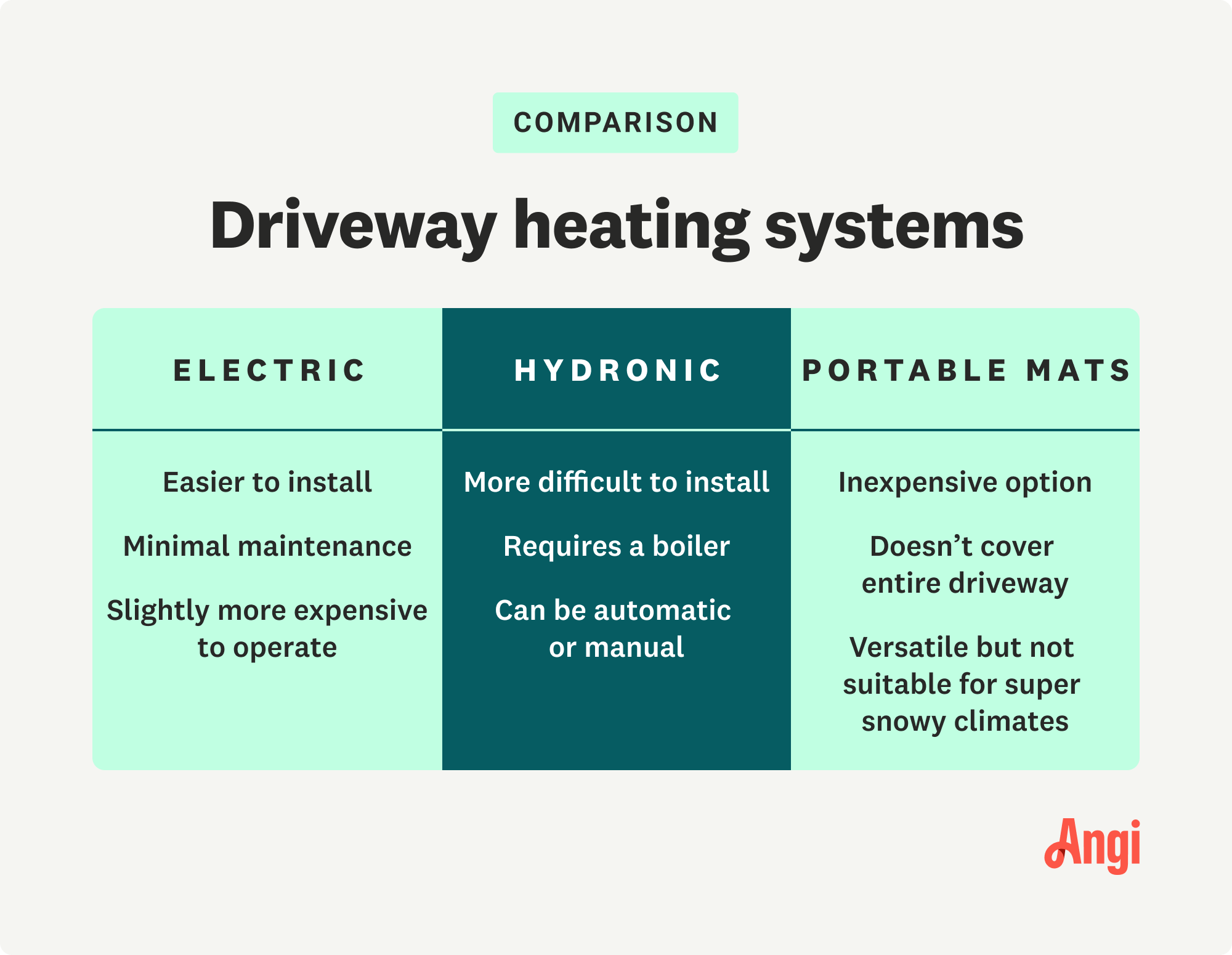
Discover the average cobblestone driveway cost based on factors like the size and scope. Keep reading to budget for a cobblestone driveway.
Melt your troubles away this coming winter


Heated driveways cost between $12 and $25 per square foot.
Portable mats cost the least but have the shortest lifespan.
Hydronic systems require a boiler and are harder to install but have a low operating cost.
Electric heated driveways cost the most to operate but cost less upfront than hydronic systems.
Hire a pro to install a built-in heated driveway system.
If you’re ready to say goodbye to your trusty, old shovel this winter, then a heated driveway system is the perfect solution. You have three main options for a heated driveway, and knowing all the ins and outs of each one can help you secure the best system for your home. We’ve got your driveway covered with everything you need to know to help you get started.
Heated driveway systems use radiant heat to melt your driveway during the winter months. Some systems work underneath your driveway’s surface material, while others operate on top of the driveway. Driveway heating systems use electricity, gas, oil, or solar primarily as fuel, but some can even use wood.

There are three main types of heated driveways: electric, hydronic, and portable mats. Let’s break down each type and look at the pros and cons of heated driveway systems to help you decide which is best for your driveway.
Electric heated driveways use insulated cables inside mesh mats to send electricity across your driveway and melt ice and snow. This heated driveway system goes underneath the surface layer of your driveway and connects to your electrical system via a buried electrical line. These driveway heater systems are either manual or automatic, depending on your personal preference and budget.
| Pros | Cons |
|---|---|
| Easier to install than hydronic driveways | Higher operating costs |
| Less expensive than hydronic driveways | Less versatile |
| Doesn’t need a mechanical room | |
| Easy to configure | |
| 20-year lifespan | |
| Energy-efficient |
Hydronic heated driveways use a boiler and pumps to send hot water and antifreeze through polymer tubing. The heat spreads through the tubing and the surrounding areas to warm your driveway. Hydronic boilers can be gas, electric, oil, solar, or even wood-fired, giving you more fuel options for your system. Like electric heated driveways, hydronic systems come in automatic or manual.
| Pros | Cons |
|---|---|
| Lower operating costs | Higher cost than electric driveways |
| Works quickly | Harder to install |
| Suitable for large areas | More difficult to repair |
| 20-year lifespan | Requires more maintenance |
| Needs space for pump and boiler | |
| May have uneven heating |
Portable heated driveway mats consist of a durable polymer material containing electric heating elements. These mats go on top of your driveway and are safe to drive over, making them easy to install. To power the mats, simply plug the mats into a nearby electric outlet and operate with the remote control.
| Pros | Cons |
|---|---|
| Lowest cost | Doesn’t offer full coverage |
| Easy to DIY | Less effective in heavy snow |
| Adjustable and customizable | Needs storage space in warmer seasons |
| Ideal for existing driveways | You must lay them out every year |
| Only lasts five to 10 years |
The average heated driveway costs around $13,000 with labor—but prices range from $3,600 to $25,000. How much you’ll pay for a heated driveway depends on the size of your driveway, driveway material, accessibility, system type, and features.
For instance, portable mats cost around $1,500 per mat, and most driveways need at least two, putting total costs at around $3,000. Electric systems cost around $4,500, while hydronic systems cost $6,500 on average, not including installation. Automated heated driveways typically cost more than manual driveways for their extra features.
The cost to operate a heated driveway varies by the utility rates in your area, the size of your driveway, and the harshness of the winter. Electric systems tend to be more expensive to run than hydronic, but either system typically costs $150 to $600 per year to operate.
If you’re installing a portable heated driveway system, you might be able to DIY the job. However, to install an electric or hydronic heated driveway, you must install it before you lay the surface material for your driveway, or you’ll need to repave your driveway. Installing a new driveway or repaving one is a major undertaking. We recommend working with a driveway paving pro near you to install a built-in heated driveway.
Once you’ve installed your heated driveway, maintaining it is the best way to get your money's worth. Here are a few key maintenance tips for a long-lasting heated driveway:
Repair your driveway as soon as you notice an issue.
Routinely clean your driveway throughout the year.
Don’t overload your electrical circuit.
Inspect the driveway for signs that it’s time to replace your driveway.
Hire a technician to inspect your boiler for your hydronic system before winter.
Keep heavy vehicles off your driveway.
Put your portable heated driveway mats in a dry storage space when not in use.
Hire a professional to install your heated driveway correctly.
From average costs to expert advice, get all the answers you need to get your job done.

Discover the average cobblestone driveway cost based on factors like the size and scope. Keep reading to budget for a cobblestone driveway.

The cost of a tar and chip driveway falls between gravel and asphalt. Is this unique process the happy medium you've been looking for? Let's take a look.

When designing a driveway, it's crucial to know the cost of your driveway apron—the transitional ramp that connects you to the road. Here's what to know.

Asphalt and concrete driveways are strong and durable, but do they need protecting? Learn more about the pros and cons of sealing your driveway.

You know you need a bigger driveway, but what kind of extension should you add? Check out these driveway extension ideas to plan your new parking space.

Small cracks and holes in driveways can be repaired at home using filler and the right technique. Read this guide to learn how to do asphalt repair DIY-style.